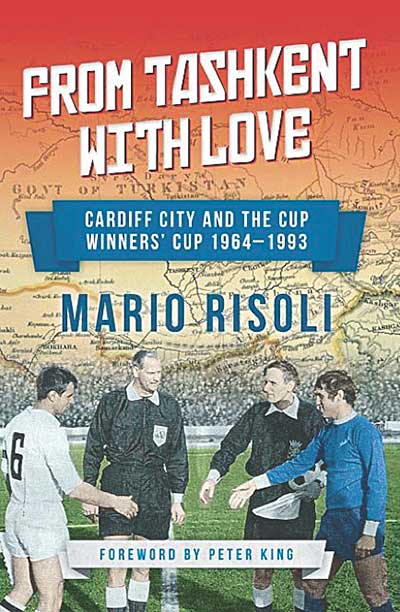 Cardiff City and the Cup Winners Cup 1964-1993
Cardiff City and the Cup Winners Cup 1964-1993
by Mario Risoli
St David’s Press, £16.99
Reviewed by Huw Richards
From WSC 338 April 2015
Collective memory tends to privilege the ancient and modern at the expense of what came in between. For Cardiff City the FA Cup win in 1927 looms with the same symbolic weight as 1966 does for England fans, while recent recall summons up unwanted red shirts, thwarted promotion campaigns and misery last season.
Mario Risoli, an expert preserver of Welsh football’s past, aims here to reclaim a time when Cardiff combined being a lower-division club at home with redoubtable warriors in Europe. It needed recovering. That these achievements were in a tournament which no longer exists, and enabled by a route Cardiff can no longer take – winning the Welsh Cup – cuts institutional continuities. And while the last venture was in 1993, the core of this history (and two thirds of its length) is contained in the years between 1964 and 1971.
Risoli draws on press archives and an outstanding collection of interviews with former players. They offer a vivid picture of European competition before it was subsumed to club business plans, as a glorious break from mundane reality and, in a less travelled age, a venture into the unknown.
Even that future footballing cosmopolite John Toshack could recall of the food in Tashkent in 1968: “It was like dog food. The only thing that we could eat were these big bread rolls. We called them discuses.” Entrepreneurial players took chocolates, ties and socks to sell in Moscow, only as Bobby Ferguson recalls: “We ended up eating most of the chocolate and giving the rest away because the people were so nice.”
Along with the tales of Cardiff stalwarts such as Peter King, who contributes a fine foreword, and Don Murray are glimpses of more widely remembered careers, bracketed by John Charles’s last great display at Sporting Lisbon in 1965 and Robbie James’s final senior goal, scored in defeat by Standard Liege in 1993. At the book’s heart is a compelling warts-and-all picture of Jimmy Scoular, Cardiff’s manager from 1964 to 1973 – so competitive he would kick players in a Friday afternoon five-a-side, given to tirades of abuse and arbitrary decisions and paranoid about all foreigners, yet still cherished by many of his players.
And the title gets it right. Beating Real Madrid 1-0 in 1971 is the most remembered achievement of this whole period. Yet the truly historic feat was the extraordinary expedition of 1968, passing through Breda, Moscow, Tashkent and Augsburg en route to a semi-final defeat by Hamburg which ranks for heartbreak alongside the missed penalty that cost Cardiff the League title in 1924. Risoli might perhaps have made more of fan memories and put his excellent game-by-game narration more into the wider context of the club’s history. There should certainly have been an index included. But with all that, he has produced both a great read and a real contribution to football’s collective memory.



